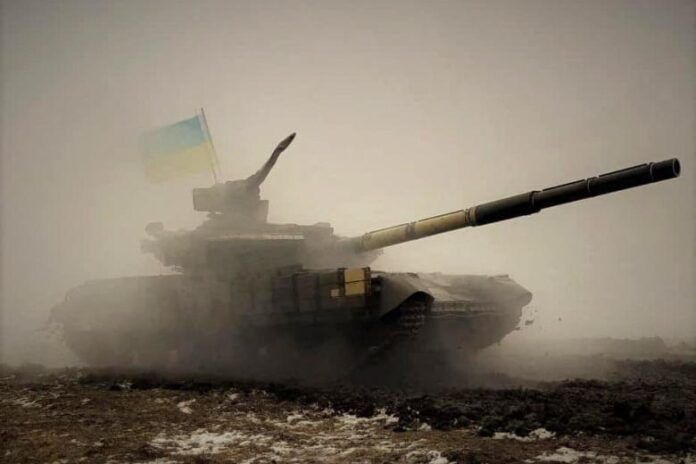A Ukrainian tank during a drill in the Dnipropetrovsk region of Ukraine on Feb 8, 2022. – AFP photo
BERLIN (Feb 10): Hopes rose on Wednesday (Feb 9) that efforts to stop Russia from invading Ukraine may be starting to pay off, with German Chancellor Olaf Scholz joining Kyiv and Moscow in a chorus of “positive” voices assessing that diplomatic bids to defuse the crisis could work.
In the face of the worst stand-off between Russia and the West since the Cold War, diplomatic action has kicked into high gear, taking French President Emmanuel Macron to Kyiv and Moscow earlier this week.
After separate talks with Russian President Vladimir Putin and Ukraine leader Volodymyr Zelensky, Mr Macron said on Tuesday he glimpsed a way forward towards easing tensions.
The Russian leader had told him that Moscow “would not be the source of an escalation”, he said.
While the West accuses Russia of having massed 100,000 soldiers near Ukraine’s borders, Ukrainian Foreign Minister Dmytro Kuleba said “diplomacy is continuing to lower tensions”.
“The way the greater European community responds to this crisis will determine the future of European security and of each individual European state,” he said.
More upbeat noises also emerged from Moscow, with Kremlin spokesman Dmitry Peskov telling reporters “there were positive signals that a solution to Ukraine could be based only on fulfilling the Minsk agreements”, which ended the worst of the fighting in 2014 between Ukraine and Russian-backed separatists.
Scholz, who had come under fire at home over his dithering response to the Ukraine crisis, said he saw progress after a flurry of talks on various levels.
“The task is that we ensure the security in Europe, and I believe that will be achieved,” he added after meeting Denmark’s Prime Minister Mette Frederiksen.
On Wednesday, Macron briefed his United States counterpart Joe Biden on his talks with Putin and Zelensky, the White House said.
Even as diplomatic efforts intensify, Pentagon spokesman John Kirby warned that Putin was continuing to send troops to the border.
“We have continued to see even over the last 24 hours additional capabilities flow from elsewhere in Russia to that border with Ukraine and Belarus,” he told reporters.
But Ukraine’s Deputy Defence Minister Ganna Malyar said the Russian forces on the frontier did not appear to be ready to launch an all-out assault, and were instead being used primarily “for political pressure and blackmail” at this stage.
Scholz, who is to huddle with Baltic leaders on Thursday, is accelerating his diplomatic pace to reassure allies that Germany would not be the weakest link among allies in standing up to Russia.
Less than 24 hours after a trip to Washington, Scholz late on Tuesday stood alongside Polish leader Andrzej Duda and Macron to declare the Europeans’ unity in their goal of averting war.
Scholz, who took over from Dr Angela Merkel in December, has been struggling to emerge from behind the veteran leader’s shadows.
Noisier voices debating the Western response, including within his own Social Democrats, have at times drowned him out, leading critics to question Germany’s resolve in the crisis.
Scholz will travel to Kyiv and then Moscow next week, where he will have his first face-to-face meeting with Mr Putin.
Britain has also intensified action, with Foreign Secretary Liz Truss in Moscow on Wednesday to deliver a message that Russia must choose a peaceful path in Ukraine or face massive consequences from Western sanctions.
British Prime Minister Boris Johnson will visit Poland on Thursday, after Britain promised to send 350 more troops to Poland’s border with Belarus.
Putin, who has demanded sweeping security guarantees from the North Atlantic Treaty Organisation alliance and the US, said after his talks with Macron that Moscow would “do everything to find compromises that suit everyone”.
He said several proposals put forward by Macron could “form a basis for further steps” on easing the crisis over Ukraine but did not give any details.
At the same time as sending military hardware to Ukraine’s borders, Putin has issued demands that the West says are unacceptable, including barring Ukraine from joining Nato and rolling back alliance forces in eastern Europe.
The French presidency said Macron’s counter-proposals included an engagement from both sides not to take any new military action, the launching of a strategic dialogue and efforts to revive the peace process for Ukraine’s conflict.
It also said an agreement would ensure the withdrawal of around 30,000 Russian soldiers from Belarus at the end of joint military exercises later this month.
The Kremlin insisted it never intended to leave the troops permanently on Belarusian territory.
The West faces a tough task trying to convince a wary Zelensky to accept any compromises.
Kyiv has laid out three “red lines” it vows not to cross – no compromise over Ukraine’s territorial integrity, no direct talks with the separatists, and no interference in its foreign policy. – AFP


